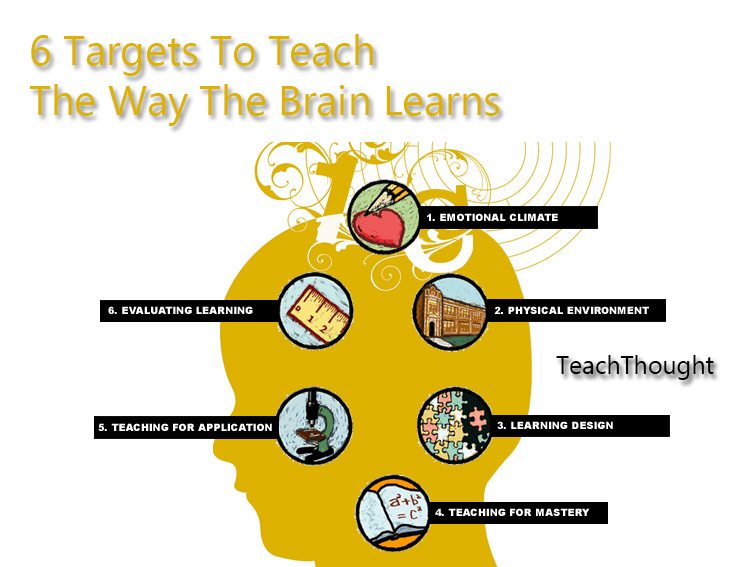20 Brain-Based Learning Resources For Teaching
by TeachThought Staff
Researchers in neuroscience, psychology and education are uncovering new information about how brains learn best at an unbelievable pace.
We have more insight into the brain’s learning processes than at any other moment in history, and we are poised on the brink of a radical shift of how we think about education. Researching the conditions that allow brains to learn most easily enables innovation and optimization for learners in formal and informal settings. There are countless applications for the findings of the new science of learning, including:
Deeper understanding of cognitive deficits and the unique circumstances that affect everyone’s learning capacity. More nuanced information about memory, cognition, and comprehension in various settings: better understanding of motivation, metacognition, and what drives us to learn at all.
See also How The Brain Works–And How Students Can Respond
We are incredibly excited about all of the new knowledge being discovered by researchers examining the neurological and psychological underpinnings of learning and education systems, and we can’t wait to see what the future has in store. The organizations, blogs, research labs, and brain-based learning providers below have diverse perspectives and an incredible range of information about the new science of learning, and we think every single one is worth checking out.
Cognitive Neuroscience & Learning Research
Cognitive neuroscience researchers are at the forefront of the new science of learning. Understanding the deep structures of the brain, how they react to sensory input, and how they store information is crucial for attaining a deeper understanding of how people learn.
MIT’s Department of Brain and Cognitive Sciences
MIT’s Department of Brain and Cognitive Sciences combines neuroscience, biology and psychology. They stud specific aspects of the brain and mind including learning and memory, neural and cognitive development, language and reasoning.
Stanford Cognitive and Systems Neuroscience Laboratory
Under the direction of Dr. Vinod Menon, the SCSNL investigates human cognition and learning. Based out of Stanford, they use advanced brain imaging techniques such as MRI, DTI, and EEGas well as behavioral, genetic, neural network modeling, and computational methods in their research.
Staglin IMHRO Center for Cognitive Neuroscience
The Staglin IMHRO Center for Cognitive Neuroscience is UCLA’s research center for inquiries into the neural underpinnings and phenotypic conditions that correlate with cognitive anomalies. The center is currently studying the neural bases of creativity, social communication, autism, schizophrenia, memory mechanisms, and many other brain functions, disorders, and conditions.
University of Cambridge Centre for Neuroscience in Education
The main research goal of the Centre is to establish the basic parameters of brain development and understand cognitive skills critical for education. They aim to understand how the brain functions and changes during the development of reading, math, and other subjects.
Eric Jensen
An authority on brain-based education, Jensen has authored numerous books, including Teaching with the Brain in Mind and Brain-Based Learning, focusing on practical applications of neuroscience in teaching.
Dr. Donna Wilson
An educational psychologist and author, Wilson has developed programs integrating cognitive research into classroom practices, emphasizing metacognitive strategies for educators.
Marcus Conyers
Co-developer of the BrainSMART program, Conyers focuses on translating mind, brain, and education research into strategies that enhance teaching and learning.
Dr. Daniel T. Willingham
A cognitive psychologist at the University of Virginia, Willingham’s research centers on the application of cognitive psychology and neuroscience to K–12 education.
Dr. Mary Helen Immordino-Yang
A neuroscientist and educator, she explores the neural bases of social emotion and self-awareness and their implications for learning in educational settings.
Dr. David A. Sousa
An international consultant in educational neuroscience, Sousa has authored books that bridge neuroscience research and educational practice.
Dr. Mariale Hardiman
Co-founder of the Neuro-Education Initiative at Johns Hopkins University, Hardiman focuses on enhancing educational practices through research on how the brain learns.
Dr. Tracey Tokuhama-Espinosa
An expert in mind, brain, and education science, she has authored works that integrate neuroscience, psychology, and education to improve teaching practices.
Dr. Robert Sylwester
An emeritus professor of education, Sylwester has written extensively on educational neuroscience, emphasizing the biological basis of learning.
Dr. John Medina
A developmental molecular biologist, Medina authored Brain Rules, focusing on how the brain sciences might influence the way we teach and work.
Dr. Kurt Fischer
Founder of the Mind, Brain, and Education program at Harvard Graduate School of Education, Fischer’s work integrates cognitive science, neuroscience, and education.
Dr. Stanislas Dehaene
A cognitive neuroscientist, Dehaene’s research on numerical cognition and reading has significant implications for educational practices.
Dr. Adele Diamond
A developmental cognitive neuroscientist, Diamond’s work on executive functions has informed educational approaches to enhance cognitive development.
Dr. Michael Gazzaniga
A leading neuroscientist, Gazzaniga’s research on hemispheric specialization offers insights relevant to educational strategies.
Dr. Patricia Wolfe
An educational consultant, Wolfe focuses on the application of brain research to educational practice, authoring Brain Matters: Translating Research into Classroom Practice.
Dr. Howard-Jones
A professor at the University of Bristol, his research combines neuroscience and education to explore learning processes and inform teaching methods.
Dr. Uta Frith
A developmental psychologist, Frith’s research on autism and dyslexia has profound implications for educational practices and understanding learning differences.
Dr. Sarah-Jayne Blakemore
A professor of psychology, Blakemore’s research on adolescent brain development informs educational approaches tailored to this age group.
Dr. Eric Kandel
A Nobel laureate neuroscientist, Kandel’s work on the molecular mechanisms of memory provides foundational knowledge applicable to educational strategies.
